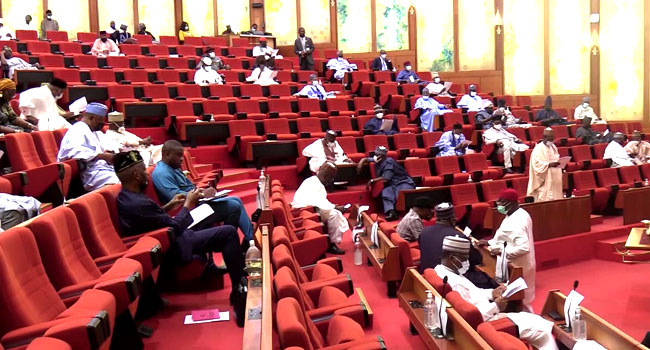The Senate, Tuesday, was in a fix as President Muhammadu Buhari declined assent to the 2021 Electoral Act Amendment Bill.
During plenary, the Senators held a closed-door session and discussed President Buhari’s letter to them in which he explained his refusal to sign the bill.
Recall last week, the Attorney-General of the Federation, Abubakar Malami (SAN), has x-rayed the challenges that would face the inclusion of mandatory direct primaries in the Electoral Act amendment bill.
After the closed-door session, Senate President Ahmad Lawan quoted Buhari as saying that he declined assent over the direct primaries clause.
See also
- Malami Raises Fear on Direct Primaries
- Senate backtracks, adopts electronic transmission of election result
- National Assembly okays Electoral amendment Act, electronic transmission of results
He said the President reached the decision having received strong advice and carefully reviewed the bill and in light of present realities.
Direct primaries, Buhari’s letter read, will have serious adverse legal and financial consequences which cannot be accommodated just as the clause will have implications on the right of citizens to take part in governance.
Buhari further argued that the conduct of direct primaries will lead to a significant spike in the cost of conducting elections. This, he maintained, will mean a huge financial burden on political parties and the Independent National Electoral Commission (INEC).
He added that amending the bill to only accommodate direct primaries will stifle smaller parties, and thus not healthy for multi-party democracy.
According to him, this will throw up security challenges and it will overstretch security agents because of the large turnout of party members who will vote in direct primaries.
President Buhari added that the proposed amendment will give rise to a plethora of litigation, stating that he is constrained to withhold assent to the bill on the premise of all the points noted above.
Political parties, he said, should be able to pick how they decide to choose candidates for elections.
But the development did not go well with some lawmakers, prompting the Senate to go into another closed-door session.
This was after Senator George Sekibo requested that the house should go into a closed-door session to discuss Buhari’s letter.
He said that the Senate must discuss the President’s letter and take a decision on it.
Ozekhome, Wike hammer Senators in failing to veto President
Human rights lawyer, Mike Ozekhome (SAN), said the Constitution empowers the National Assembly to override the President Buhari, for failing to assent to the Electoral Bill.
Ozekhome said, “You have to go to Sections 58, 59 and 4 of the Constitution. The Constitution gives the legislative powers of the nation to the National Assembly made up of the Senate and the House of Representatives. That Section 4 gives power to the National Assembly to make laws for the peace, order and good governance of Nigeria.
”It doesn’t say for the insecurity, disunity or mismanagement of the country. That means whatever steps the National Assembly takes must be to advance the democratic course of Nigeria towards better governance and dividend of democracy. So, under Sections 58 and 59, when the President vetoes a Bill sent to him by the National Assembly, all hope is not lost.
”Those sections empower the National Assembly to override that veto by the President through a two-third majority vote. And the law is that the bill shall become law without the assent or signature of the President.”
Also, Governor Nyesom Wike of Rivers State, believes the President’s move is not connected to the direct mode of primaries.
Wike, a former minister, had earlier claimed that the President’s decision was due to his fears over the electronic transmission of result clause, but noted that Buhari has no reason to decline assent to the bill.
“The ruling party in their conspiracy is trying to deceive Nigerians that the mere inclusion of the direct primaries in the electoral act amendment bill is the problem why the President does not want to sign or why he has refused to sign,” Wike said on Sunday during an interview on Channels Television’s Sunday Politics.
“The major issue is the transmission, the electronic transmission of results.”

